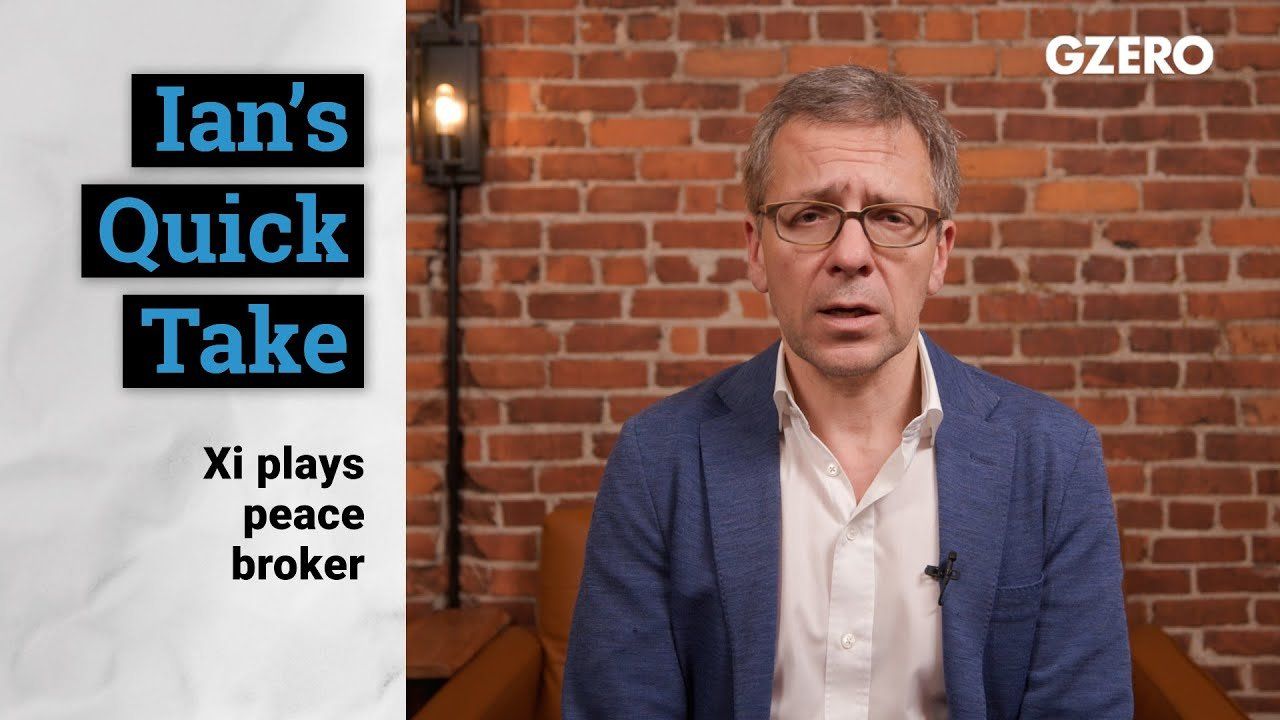
Ian Bremmer's Quick Take: Hi everybody. Ian Bremmer here and a Quick Take from Los Angeles of all places, but I want to talk about the latest, with the war in Ukraine.
We have seen a little bit more fighting over the last week, the Ukrainians facing more bombing against its civilians and unfortunately significant numbers dead, including children. And the Ukrainians with a drone attack against an energy and oil depot in Crimea with some pretty big explosions and damage to infrastructure presently held illegally by the Russians. In between all that, the big news of the week was Xi Jinping, President of China, finally belatedly, but importantly reaching out directly to President Volodymyr Zelenskyy. They spoke for an hour. It was, and be sure this was planned on the anniversary of the Chernobyl disaster, and coming out of it, the Chinese telling Zelenskyy that they would very much support doing a lot to directly provide economic support for reconstruction, but in return, they want to see a ceasefire: in other words, ending this war as soon as possible.
Now, Ukraine is not going to accept that. They have a demand of a peace plan, 10 points that they've put together, which includes getting all of their land back and having the Russian president and others tried as war criminals and having war reparations paid by Russia to Ukraine, none of which is going to be negotiated by Putin. Plus, there is a counter-offensive that the Ukrainian government, one of the most telegraphed counter-offensives, probably in history, preparing to launch with significant support from the United States and NATO on the ground really any day now, and they're hoping to get more of their territory back. It's very unlikely they'll be able to break the land bridge between Russia and Crimea, which would be the biggest strategic loss that plausibly the Russians could face soon. It is likely that they will be able to take some territory back from the Russians who have about 350,000 troops dug in defensive positions over the course of the next few months, and then that's probably about the extent of how much the territory is likely to move in the coming six to 12 months.
And that means with the American presidential elections coming up with a reasonable likelihood that Trump gets the GOP nomination and much less supportive of the Ukrainians, and with many of the Europeans in particular, the French, but also the German, the Italians, the Spaniards, and others, much more interested in starting negotiations. That's why the Chinese offer starts to look interesting because at this point, Xi Jinping may not have the support of Ukraine, but he may have the support of significant pieces of the Western coalition.
Xi Jinping also is the most important global leader that can speak at length directly to Zelensky and Putin. The Americans and NATO members can't do that. They all think that Russia is run by a war criminal. Erdoğan is the one exception though he's in bad health right now, and he might not be president for much longer in Turkey with elections that are looking very dicey. It's also going to face an enormous amount of backlash either way, given how close that election is going to be run. Then you've got the Secretary-General, the UN, my good friend António Guterres, who has working relations with both leaders, but not nearly as strong as the Chinese president does.
So given all of that, suddenly Xi Jinping looks to be in a position where the diplomacy around Ukraine in say four months, six months, nine months time of the world, seems more aligned with him than it does with the Americans, and that's exactly why he decided to announce what he did. That's why he decided to make that call. Is it going to work? It's hard to see. I mean, the space between the Ukrainians and the Russians continues to be very large indeed, but to the extent that there's likely to be any negotiations reopening between the Russians and the Ukrainians, not at the head of state level, but at some working level, high diplomatic level, the Chinese are likely to play much of a role.
In this regard, what Xi Jinping did on the back of the negotiation breakthrough that they've had with Iran and Saudi Arabia as well as their foreign minister a week ago, reaching out to both the Israeli and Palestinian foreign ministers and saying, hey, we can be an honest broker in a way that the Americans for whom Israel is their top ally in the Middle East, cannot. We want to play that role. They're not going to get a breakthrough, but they can show the global South and even some of the advanced industrial democracies that China can potentially be someone you want to engage with on international diplomatic issues.
That is exactly where Xi Jinping wants to be. He's in a much better position globally, not just with Putin, but also on the international stage than he was six months, nine months, certainly 12, 14 months when the Russians launched the war in Ukraine, February 24th ago. That is a big deal. It's something the Americans are uncomfortable with. They're going to be watching very, very carefully, and it's potentially a problem for NATO. So watch this space. This is where we are. Root for the Ukrainians with the counter-offensive. We'll see where it goes, and then we'll see if negotiations actually open.